MercoPress. South Atlantic News Agency
Tag: Venezuela Elections
-
Monday, July 29th 2024 - 10:40 UTC
Boric says Maduro's victory in Venezuela's presidential election is hard “to believe”
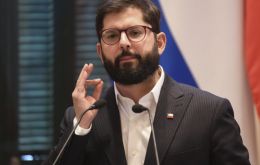
Chilean President Gabriel Boric expressed serious doubts on Monday regarding the legitimacy of Venezuela's presidential election results, which declared incumbent President Nicolás Maduro the winner. Boric emphasized that his government would not recognize any outcome that could not be verified through transparent processes.
-
Monday, July 29th 2024 - 10:30 UTC
Maduro celebrates victory from Miraflores Palace

Venezuelan President Nicolás Maduro greeted his followers from Caracas' Miraflores Palace to celebrate victory after the National Electoral Council (CNE) announced that he had defeated opposition candidate Edmundo González Urrutia. According to CNE Chairman Elvis Amoroso, Maduro collected 51.2% of the vote, against his rival's 44.2% with 80% of the vote counted.
-
Sunday, July 28th 2024 - 12:16 UTC
Venezuela votes: A Nation at a crossroads after 25 Years of Chavismo
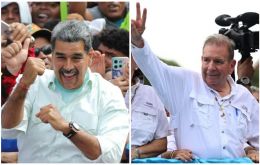
Venezuelans are heading to the polls today in a highly anticipated presidential election that could end a quarter-century of Chavismo. The nation faces a crucial decision between maintaining the current government under President Nicolás Maduro or opting for change led by opposition candidate Edmundo Gonzalez, supported by political leader Maria Corina Machado.
-
Friday, July 26th 2024 - 10:53 UTC
Maduro's “bloodbath” message turns leftwing governments against him
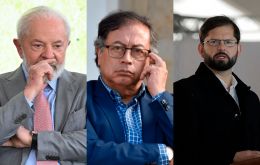
Leftwing governments in South America seem to have turned their backs on Venezuelan ruler Nicolás Maduro after he forecasted last week that his country would be heading for a bloodbath if he failed to win Sunday's presidential elections.
-
Tuesday, July 23rd 2024 - 12:23 UTC
Uruguayan FM hopes Venezuela holds peaceful elections

In the week prior to Venezuela's elections, Uruguayan Foreign Minister Omar Paganini insisted that “it is time to defend democracy” in that country so “that the people can freely choose their government.” He also called for the process to be held “in peace” and hoped that the votes would be “counted with transparency.” After that, he wished the outcome would be accepted by all those involved.
-
Monday, July 22nd 2024 - 22:09 UTC
Lula criticizes Maduro's “bloodbath” threat ahead of Venezuelan Elections
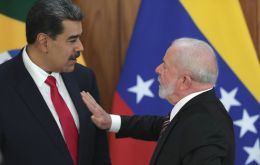
Brazilian President Luiz Inácio Lula da Silva expressed alarm at Venezuelan President Nicolás Maduro's recent remarks suggesting potential violence if he loses the upcoming election. Speaking in an interview with international news agencies, Lula condemned Maduro’s statements, which included threats of a “bloodbath” and “civil war,” as dangerous and unacceptable.
-
Saturday, July 20th 2024 - 11:42 UTC
LatAm countries concerned over harassment and persecution of opponents in Venezuela

Uruguay, Argentina, Costa Rica, Guatemala, and Paraguay Friday signed a declaration expressing these countries' concern over the mounting “harassment and persecution” the Venezuelan regime of President Nicolás Maduro is exerting on opposition leaders ahead of the July 28 elections which most pollsters foresee he is bound to lose.
-
Friday, July 19th 2024 - 10:52 UTC
Maduro speaks of “bloodshed” if he is not reelected

Venezuelan President Nicolás Maduro foresaw a “bloodbath” in his country if he fails to be reelected on July 28. According to the most recent surveys, he would be trailing opposition candidate Edmundo González Urrutia by more than 10 percentage points.
-
Tuesday, July 16th 2024 - 08:22 UTC
Possible escalation of conflict between Venezuela and Guyana over Essequibo feared in Brazil
![A patriotic sign in Guyana advertises the region of Essequibo as the country's own [Nazima Raghubir/Al Jazeera]](/data/cache/noticias/100522/260x165/essequibo.jpg)
The delivery to Brazil of Israeli-built missiles has been linked to fears that the dispute between Venezuela and Guyana over the oil-rich Essequibo region might escalate in the wake of the fudgy July 28 elections. With the most prominent opposition politicians disenfranchised, Caracas might fuel an international conflict to cover up for the domestic unrest expected to unfold, it was hinted.
-
Saturday, June 22nd 2024 - 09:40 UTC
Maduro says “rightwing” opposition plans to cry foul at July 28 elections and launch a revolt
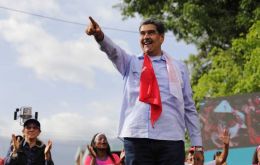
Venezuelan President Nicolás Maduro warned Friday that the “fascist rightwing” opposition would be crying “foul” after the upcoming July 28 elections and then promote a coup d'état “at any moment.” Maduro insisted he had proof that presidential candidates Edmundo González Urrutia and Enrique Márquez intended to follow that path to ignite “violence” after neither of them signed an agreement to recognize the outcome of the result of the elections earlier this week.
